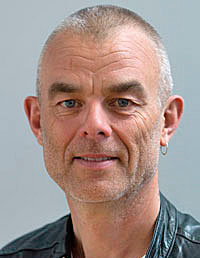New professor of ecosystems and environmental sustainability at IGN
Climate change means more CO2, higher temperatures and changes in precipitation. It will affect our ecosystems – but how? Here, Claus Beier has his core activities. For more than 25 years he has worked on the effects of climate change, air pollution and land use on plants and ecosystems and has just been appointed Professor at the Department of Geosciences and Natural Resource Management at the University of Copenhagen.
 Claus Beier is new professor of ‘ecosystems and environmental sustainability’ at the Department of Geosciences and Natural Resource Management. The professorship will help to strengthen the research in ecosystem responses to climate and environmental impacts. Claus Beier will, among other things, focus on facilities and infrastructure to support research and he highlights the interaction between observations, experiments and models as being important. "I also hope to be able to contribute to the strengthening of the interdisciplinary collaboration between the department's subject areas in order to provide the knowledge necessary to create a sustainable societal development," says Claus Beier.
Claus Beier is new professor of ‘ecosystems and environmental sustainability’ at the Department of Geosciences and Natural Resource Management. The professorship will help to strengthen the research in ecosystem responses to climate and environmental impacts. Claus Beier will, among other things, focus on facilities and infrastructure to support research and he highlights the interaction between observations, experiments and models as being important. "I also hope to be able to contribute to the strengthening of the interdisciplinary collaboration between the department's subject areas in order to provide the knowledge necessary to create a sustainable societal development," says Claus Beier.
Manipulation of ecosystems
Claus Beier describes himself as 'manipulator'. Manipulation of ecosystems in the field is a core constituent in the research methodology; he and his colleagues use to test hypotheses of the environmental impacts on ecosystems. As a manager of the Villum Centre CLIMAITE Claus Beier together with researchers from DTU, UCPH and AAU designed a biological time machine in a natural area in North Zealand. The researchers can here affect ecosystems with one or more of the climate change related factors: increased CO2, temperature and altered precipitation. It gives the opportunity to map the impacts, but also, and equally important the interaction among them. The idea is to work as realistic as possible to get a credible picture of how ecosystems will react to changes and pressure.
Global performance
Results have attracted attention worldwide. They show, among other things, that the interaction between factors can result in effects, which are difficult to predict, even if you know the effects of the individual factors. In addition, the results modifies the idea that increased CO2 in the atmosphere will have a ' fertilizer effect', resulting in increased plant grow, leading to a removal the extra CO2. This idea does not apply in general.
Extreme climate events
Currently Claus Beier’s research is in particular focusing on the understanding of the carbon cycle and how it is affected by the climate change through changes in plant growth, soil-plant interactions, vegetation dynamics, diseases and biodiversity. He is particularly interested in the effects of extreme climate events: What will the impact be of these and how do we conduct realistic experiments.
Learn more
Learn more about the future of ecosystems, when Claus Beier holds his inaugural lecture Friday, June 10 at 14-16 with the title ‘Looking into the future - time traveling, biological time machines and scientific perspectives.’ The lecture will take place in Festauditoriet, Bülowsvej 17, Frederiksberg. There will be a reception after the lecture. Everybody is welcome to attend.
About the new professor
Claus Beier is 58 years old, qualified MSc Engineering and a PhD in 'Atmospheric deposition of N and S compounds in Denmark". He began his career at Forest & Landscape followed by a number of years as Senior Researcher and Centre Director at Risø National Laboratory 1996-2013 and was then Research Director at NIVA, Fagsenter for Nedbørfelt and Urbant Vannmiljø in Norway. Since May 1st, 2015, Claus Beier has been Head of Department at the Department of Geosciences and Natural Resource Management.
Contact
Claus Beier
Head of Department, Professor
cbe@ign.ku.dk
Tel. +45 3533 4233
Mobile +45 9356 5244
Tilde Tvedt
Communications Officer
tit@ign.ku.dk
Tel. +45 3533 1772
